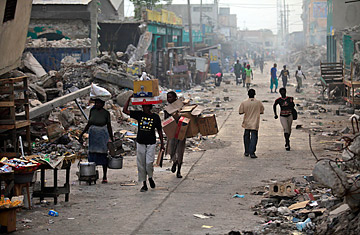
Earthquake survivors walk in a street with debris in downtown Port-au-Prince.
A simple turn of the radio dial, and news of the reconstruction plan dominates Haiti's airwaves. At the U.N. donor conference on Wednesday, the international community pledged more than $5 billion dollars to support Haiti for the next 18 months and almost $10 billion for the next five years. These are enormous figures aimed at transforming the poorest country in the Western hemisphere, which has become even more dire after the catacylsmic Jan. 12 earthquake. But as crucial as the donor news was, many Haitians made homeless by the temblor, like Patrick Nordeuse, 43, have simply tuned out. "I used to listen to the radio after the earthquake, but it would just depress me when I saw nothing was being done," says Nordeuse.
It's been more than two and a half months since the earthquake shook every fiber of Haitian society. I was here on a trip from the U.S. to visit my family when it hit and have stayed for most of the aftermath. But when I look at the streets of Port-au -Prince, the catastrophe still seems so much closer in time, as if it has just happened. Monstrous piles of rubble still hold the remains of thousands of earthquake victims. Haitians drift with no purpose during the day, returning to insecure shelters at night.
Haitians have waited patiently during the planning phase for reconstructing this Caribbean nation. And now plans reveal that a joint commission between Haitian authorities and the international community, co-chaired by Haitian Prime Minister Jean-Max Bellerive and former U.S. President Bill Clinton, will manage the funds. When I revealed the news to a family member, she jokingly said, "They're giving the money to the state! Good, I work for the state." It is a very serious joke. Haitians are concerned that aid money will not trickle down to the people but instead be used by the government to take care of its own.
"If it's Haitian people taking care of the money, they will only take care of their clan," says Osnel Smythe, 37, a security guard who earns a decent wage of about $200 a month. "The international community could put $8 billion into Haiti and nothing will work correctly." This was exemplified with reports after the earthquake of government-affiliated community leaders selling coupons for food aid intended to be free. Haiti is one of the 10 most corrupt countries in the world, according to Transparency International's world index of corruption. The government has yet to earn the trust of the people. It cannot simply be placed at the helm, expecting citizens to believe in it.
"We Haitians live in the belly of the beast," says another man made homeless by the quake who wanted to remain anonymous. "You have to be in the belly to understand the system. The people outside don't understand." Despite this record, the international community has decided to switch gears. Instead of funneling aid through non-governmental organizations, they say they will not bypass the bureaucracy of Port-au-Prince, hoping to strengthen it. Clinton recently called on all NGOs to "work ourselves out of a job" and make the Haitian government more self-sufficient.
Plans for self-sufficiency include boosting the economy, by focusing on agriculture and tourism development. There are plans to expand roadways and increase transportation capabilities with the addition of two more international airports. Clinton also says Haiti should be transformed into a wireless country with Internet access throughout. But the feeling at large in Port-au-Prince itself is that, with the Haitian government in charge, all the talk of development is a distant dream, hardly a possible reality for citizens living in makeshift tents awaiting the rainy season.
To be fair, the Haitian government has committed itself to transparency and Prime Minster Jean-Max Bellerive has agreed to the idea of posting financial documents online. But as Nordeuse sees it, the Haitian government is in a lose-lose situation. If the government succeeds, the international community will get the glory and if it fails the Haitian government will be blamed for corruption. Says Nordeuse, "Clinton has placed Bellerive in front to follow him, but Bellerive is the one who is going to take the fall when it goes wrong."
